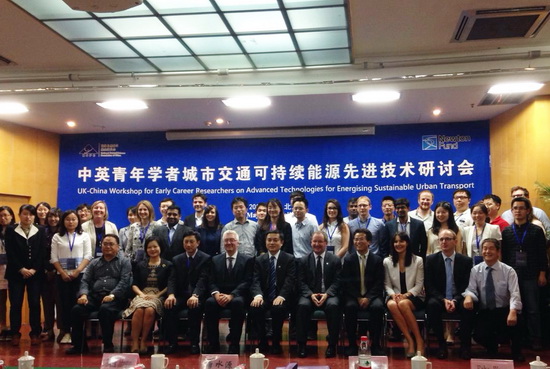 |
|
Hu Haiyan, President of the BIT, and Patrick Johnston, President and Vice Chancellor of QUB,sign a cooperation agreementon May 16.[Photo/bit.edu.cn] |
Twenty-four young scholars from the UK and China have an opportunity to exchange academic research on advanced technologies for energizing sustainable urban transport on May 16-18, in Beijing.
A three-day UK-China Workshop for Early Career Researchers on Advanced Technologies for Energizing Sustainable Urban Transport is being held in Beijing, co-sponsored by the Beijing Institute of Technology, a prestigious Chinese university focusing on science and technology, and Queen’s University Belfast, one of the UK's leading research-based universities.
 |
|
Participants of the UK-China Workshop for Early Career Researchers on Advanced Technologies for Energizing Sustainable Urban Transport take a photo at the opening ceremony on May 16. [Photo/chinadaily.com.cn] |
Hu Haiyan, President of the BIT, and Patrick Johnston, President and Vice Chancellor of QUB, gave speeches at the opening ceremony on May 16, encouraging communication and collaboration.
The workshop has gathered outstanding university lecturers, scientists, and researchers to discuss the next-generation of clean, economic urban transport technologies to improve the urban environment. They hope to make use of cross-discipline technologies to deal with challenges in urban transport for a dynamic and sustainable urban transport environment.
More than 20 scholars will give speeches during the workshop on a variety of fields, including energy production, emission control, new materials and fuels.
The opening ceremony was attended by Echo Wang, director of Education Programmes China of the British Council.
David Rooney, a QUB professor, delivered a speech after the opening ceremony on problems and opportunities in energizing sustainable transport. Sun Kening, professor and dean of the School of Chemical Engineering and Environment of the BIT has cooperated with David Rooney for many years in academic research.
The workshop serves as a link bridging early career researchers in China and the UK and lays a solid foundation for further cooperation in sustainable energy for urban transport.
The Newton Fund and the National Natural Science Foundation of China funded this event.